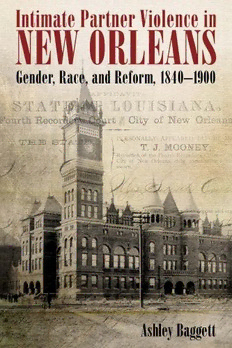
Intimate Partner Violence in New Orleans: Gender, Race, and Reform, 1840-1900 PDF
Preview Intimate Partner Violence in New Orleans: Gender, Race, and Reform, 1840-1900
Intimate Partner Violence in New Orleans New Orleans Criminal Court Building, 1895. Louisiana Division/City Archives, New Orleans Public Library. Intimate Partner Violence in NEW ORLEANS Gender, Race, and Reform, 1840–1900 Ashley Baggett University Press of Mississippi / Jackson www.upress.state.ms.us The University Press of Mississippi is a member of the Association of American University Presses. Copyright © 2017 by University Press of Mississippi All rights reserved Manufactured in the United States of America First printing 2017 ∞ Library of Congress Cataloging-in-Publication Data Names: Baggett, Ashley, author. Title: Intimate partner violence in New Orleans : gender, race, and reform, 1840–1900 / Ashley Baggett. Description: Jackson: University Press of Mississippi, [2017] | Includes bibliographical references and index. | Identifiers: LCCN 2017023657 (print) | LCCN 2017025890 (ebook) | ISBN 9781496815224 (epub single) | ISBN 9781496815231 (epub institutional) | ISBN 9781496815248 ( pdf single) | ISBN 9781496815255 (pdf institutional) | ISBN 9781496815217 (cloth : alk. paper) Subjects: LCSH: Spousal abuse—Louisiana—New Orleans—History—19th century. | Women—Abuse of—Louisiana—New Orleans—History—19th century. | Family violence—Louisiana—New Orleans—History—19th century. | New Orleans (La.)—Race relations—History—19th century. | African Americans—Louisiana—New Orleans—Social conditions—19th century. Classification: LCC HV6626.22.N66 (ebook) | LCC HV6626.22.N66 B34 2017 (print) | DDC 362.82/92097633509034—dc23 LC record available at https://lccn.loc.gov/2017023657 British Library Cataloging-in-Publication Data available To my husband and children—in the countless hours spent writing this, you were always in my thoughts and gave me purpose. To survivors of intimate partner violence—your voice matters. Contents ix Acknowledgments 3 Introduction 19 Chapter One “Husbands Are Men, Not Angels” Gender and Intimate Partner Violence in Antebellum New Orleans 43 Chapter Two “We Are All Men” Transforming Gender Expectations in New Orleans during the Civil War and Reconstruction 63 Chapter Three “Strike Me If You Dare” Abused Women of New Orleans and the Right to Be Free from Violence 83 Chapter Four “You Can’t Abuse Her in This House” Family, Community, and Intimate Partner Violence in New Orleans 99 Chapter Five “The Rule of Love Has Superseded the Rule of Force” The Criminalization of Intimate Partner Violence in New Orleans 119 Chapter Six “It Will Be Done to Maintain White Supremacy” The Decline of Intervention in the South 135 Epilogue Gender and Intimate Partner Violence in the Early 1900s viii Contents 147 Appendix 153 Notes 187 Bibliography 209 Index Acknowledgments Many people contributed to the creation of this work, and I am thankful for each and every one. For the women in my book, I hope I do justice to their lives and am grateful for the opportunity to give voice to those who were pre- viously neglected in the historical record. I began my research in nineteenth-century intimate partner violence at Louisiana State University. I ran into dead end after dead end and considered abandoning the project after finding scant references to the topic. Charles Shindo, Gaines Foster, and Alecia Long provided valuable feedback, guid- ance, and support during the early stages of research. Without their dedi- cation and mentorship I could not have written this book. Other faculty members offered important insights at different points during my graduate career, including Kodi Roberts, Rand Dotson, and Carolyn Lewis. LSU’s His- tory Department and Women’s and Gender Studies program made me the scholar I have become today, and I am immensely thankful for the guidance I received there. My colleagues at North Dakota State University helped me build upon my earlier work through suggestions and funding for travel. The Northern Plains Ethics Institute and the Department of History, Philosophy, and Religious Studies generously provided funds allowing me to continue my research across the country. Moreover, everyone in my department created a warm and welcoming atmosphere, easing my transition into a new institution. They offered advice and support, and I am grateful for such a group of colleagues. This project required countless months in the archives, particularly in Baton Rouge and New Orleans. The New Orleans Public Library’s Louisi- ana Division/City Archives became a second home to me. In the care of the library’s staff, I poured through more than twenty-five thousand cases, and they tirelessly worked to ensure that the court records were pulled when I needed them. Knowing that I faced time constraints with my travel, they would quickly keep me supplied with a steady stream of cases, working up to the last minute. Everyone remembered my methods for pulling cases and how many I could get through in a day, even with a year between visits. Often, ix
